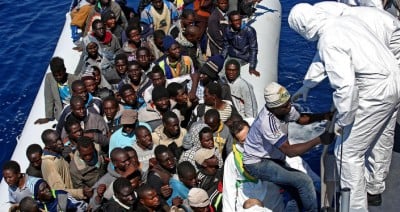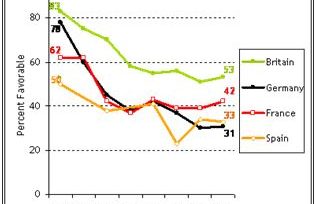
The global systemic crisis we have been experiencing for at least eight years is challenging a world order which we have often compared to the one going back not only to the end of the Second World War, but more broadly to the Renaissance and the great discoveries of late fifteenth century. 500 years ago, Europe put itself at the heart of the planet, launching an extensive programme of exploration, followed by exploitation, then colonization, and finally cooperation with the rest of the world. 500 years ago, Europe became the heart of the world.
Europe, lacking an anchor, in the middle of the raging sea
For more than eight years now, we have also been describing a wide transition from a Western-centered world to a multi-polar world, showing its countless opportunities, but, above all, the dangers presented by such a reconfiguration whenever it is poorly controlled. Thus, we constantly call for the democratic anchoring of the integrated Europe … which is essentially just an anchoring; we also call for the involvement of Europe at all new tables for debates aimed at rethinking governance at all levels, mainly at the Euro-BRICS table, which has such a potential for positive change.
All crises which have crossed Europe since 2008-2009 have had two characteristics:
– they come from the outside;
– they all reveal Europe’s structural weakness.
On this very last point, Franck Biancheri had, however, spent over 25 years working closely with the European and national institutions, alerting them based on a simple observation: the European integration had been set up as a laboratory project well-protected between the Berlin Wall and the American umbrella. Nevertheless, in the early 90s, this Europe made its entrance into history, and the winds of this history which started to blow on it, required it to implement a consolidation process which could not be anything but political, and therefore democratic. The work hasn’t been done after all, because there were too many players not having an interest in that on a short term. Europe has not been firmly anchored, and today, it floats, lacking any anchor, in the heart of a storm of Homeric proportions, being torn apart.
Failure of the nation- state model’s adaptation
Within the wide on-going geopolitical reconfiguration, there is this construction, eminently European and structural to our continent, which broke up completely: the nation state. Regional integration, globalization, the Internet and the emergence of new actors of different political cultures have made the national level, as it has existed, completely obsolete. The paradox is that Europe itself understood that, in the aftermath of its two world wars, initiating a process of overcoming this 19th century model. Yet, the visionary men who conceived this project were replaced, starting with the 90s, by a generation which basically never understood anything to Europe or the integration process, the famous baby boomers, whose leadership, particularly in the past 20 years, led to the complete failure of the European integration experience.
Europe developed its integration based on the nation states – which was a good thing, but these nation states have failed to play the game until the end and to reinvent their added-value to this new configuration. We have already said that the only added-value of the nation-states is in their ability to collaborate among each other in order to create the social change required for adaptation. Instead, the unanimity rules of any European action resulted in some political paralysis and the obvious failure of its democratization. In addition, Europe, geopolitically central, which articulated the world around itself during 500 years of supreme reign, is now torn by this world’s mutations. Europe would have needed to watch the new world as it was and note and accept any differences in an act of decoupling of the rest of the world, with the aim to rethink itself on new bases.
Multi-polarization and differentiation
The most striking example we can give of this decoupling work is the one provided by the transatlantic relationship, but we could also quote the EU-India relationship, which remained at the stage of former colonial power and former colonized state; the EU-Russia relationship, which oscillates between a pan-European vision (Russia is Europe) and Cold War flashbacks (Russia is Marxism); the EU-China relationship, which is the most perplexing (the great Asian mystery), so far from our models that Europe starts acting like a chicken in front of an ax when it comes to developing relations with China; the South Africa-EU relationship, if it exists, inevitably passes through the Netherlands and England, etc. The EU continued to watch the rest of the world only through its former input there, instead of building relations with emerging entities seen as independent actors. As a result of that, it remained structurally linked to the most outdated parts of these countries and regions, those which currently are disappearing. Yet, let’s go back to the typical example of the transatlantic relationship.
Differentiation and decoupling: the case of the US
We have repeatedly pointed out that it was imperative for Europe to detach from its American avatar, an avatar undergoing a profound change. Indeed, the transatlantic relationship is based on the fact that the United States was originally a European extension, then a European extension which took the leadership after Europe committed suicide during the two world wars. Yet, the Bush Jr. years, in particular, marked the beginning of an era of strong differentiation between Europe and the United States. This country is no longer WASP[1], the proof: even Bush campaigned in Spanish in some states, but Spanish is still European (though mixed with indigenous or African cultures); but there are also these large Chinese, Iranian, and Indian communities, which, contrary to what happens in Europe, gather in large regions, providing them with new features and giving America a social structure which does not have much to do with Europe anymore.
There is also this differentiation as regards to value systems. Until Clinton, albeit wrongly, Europeans wanted to see in the Democratic and Republican parties, a comparable European-style left and a right wing. But with Bush Jr, this was no longer possible. In terms of secularism, a value which, in our opinion, was defended by America according to Tocqueville, the constant references to God in Bush’s speeches convince us of the contrary. The death penalty, weapon carrying, questionable democracy, foreign policy … the list of all topics that start to visibly separate Europe from the United States is quite long. It would have been high time for everyone to create the conditions for their own independence from one another; not to ignore or make war with each other, but to build a new framework for cooperation, a less fusional one.
Figure 1 – Rate of European favourable opinions regarding the US during Bush junior’s mandates. Source : Pew research centre.
All the misfortunes of the world come ashore on our beaches
Some decoupling attempts did take place, but very few were completed. So little completed that, during the Euro-Russian crisis over Ukraine, in 2014, “the tail wagged the dog”: the United States directly contributed to a hallucinating escalation between Europeans and Russians which we are still not able to get over. Europe, heart of the world, finds itself on the path of a US-Russian confrontation strategy which is overtaking and crushing it… overtaking it and participating directly in the next crisis, the Syrian crisis, another one which comes from the outside, but is hitting us hard. We are not so much involved yet in the Syrian conflict, since we nonetheless resisted rather well the intervention injunctions that came from our American, Israeli and Saudi friends. Yet, we were less successful in defending the only rational policy necessary in 2011: supporting the regular Syrian army and, in exchange for this support, imposing on Bashar Al-Assad a democratic transition … or the peace plan proposed by the Russians. Many deaths, refugees and terrorism would have thus been avoided, had we objectively heard that plan four years ago, rather than just now. But Russia, and not Daesh, was the enemy we were then offered.
Is it our transatlantic link or the trans- channel one that allowed us to act like an island, the way the US or the UK did, and made us believe that we could contribute to the increase of chaos in the Middle East without suffering the consequences?
Notes:
[1] WASP, White Anglo-Saxon Protestant, archetype of the average American citizen in the 50s.
Related posts:
Views: 0
 RSS Feed
RSS Feed

















 November 24th, 2015
November 24th, 2015  Awake Goy
Awake Goy 



 Posted in
Posted in  Tags:
Tags: 
















